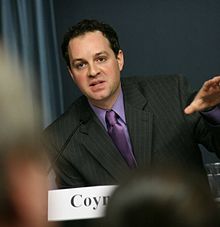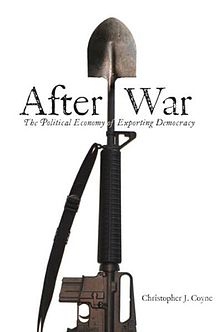- Christopher Coyne (professor)
-
Christopher Coyne is the F.A. Harper Professor of Economics at the Mercatus Center, George Mason University.
Contents
Education
After graduating in 1999 with a B.S. from Manhattan College, Coyne received his M.A. (2003) and Ph.D. (2005) in Economics from George Mason University, where he studied with Peter Boettke and Tyler Cowen.
Career in economics
After graduating from George Mason University in 2005, Coyne accepted a position as Assistant Professor of Economics at Hampden-Sydney College. In 2007, he left Hampden-Sydney to accept a position as Assistant Professor of Economics at West Virginia University. He joined the Department of Economics at George Mason University in 2010.
Besides his position at George Mason University, Coyne is also the North American Editor of The Review of Austrian Economics, a member of the Editorial Board of The Journal of Private Enterprise, a Research Fellow at The Independent Institute, a member of the Board of Scholars for the Virginia Institute for Public Policy, a member of the Advisory Board of The Cobden Centre, and Distinguished Scholar for the Center for the Study of Political Economy at Hampden-Sydney College.
The Fund for the Study of Spontaneous Orders, which is administered by the Atlas Economic Research Foundation, awarded Coyne its Hayek Prize in 2007 for:
"...a series of related articles on the influence of institutional arrangements on entrepreneurship and international development; and on weak and failed states and the problem of nation building. In these articles Coyne applies an Austrian economics perspective to argue that just as successful economies and polities can not be built from whole cloth according to rational constructivist principles, there are limits to what even well-intentioned governments can do to build free markets and free political orders elsewhere"[1]
In 2008, he was named the Hayek Fellow at the London School of Economics. In 2010, he was a visiting scholar at the Social Philosophy and Policy Center at Bowling Green State University.
Research
Coyne has numerous publications including academic journal articles, book chapters, policy papers, and book reviews. His primary areas of research include Austrian economics, economic development, and political economy.
His first book, After War: The Political Economy of Exporting Democracy, was published by Stanford University Press in November 2007 (ISBN 080475439X; paperback ISBN 0804754403). After War employs the tools of economics to analyze the ability of the U.S. to export democracy abroad. The central argument is that continued efforts to export democracy through military occupation and reconstruction are more likely to fail than to succeed due to an array of constraints facing occupiers and policymakers. In the book, Coyne contends that failure is due to the inability of foreign governments to centrally plan the complex array of institutions which underpin liberal democracy. Coyne provides a new vision of U.S. foreign policy including principled nonintervention and a commitment to free trade in goods, ideas and cultural products. He presented his book at The CATO Institute in November 2007.[2] In his review of After War in the Financial Times, Samuel Brittan concluded by noting that,
"Prof Coyne is obviously a dove rather than a hawk. But he accepts the case for occasional intervention for humanitarian reasons or to protect US citizens. His main suggestions are to avoid nation-building types of intervention and adopt free trade, if necessary unilaterally by the US. It is perhaps déformation professionelle for economists to overrate the spillover benefits of the latter. But peace and welfare may depend on how far the next US president accepts the main lines of his analysis – a subject even more important than the current credit crunch."[3]
In, Media, Development, and Institutional Change, (Edward Elgar Publishing, 2009, ISBN 1847204783) Coyne and Peter Leeson investigate mass media's ability to affect institutional change and economic development. They analyze media's role in enabling and inhibiting political-economic reforms that promote development. The book explores how media can constrain government, how governments manipulate media to entrench their power, and how private and public media ownership affects a country's ability to prosper. Coyne and Leeson identify specific media-related policies that governments of underdeveloped countries should adopt if they want to grow. They also illustrate why media freedom is a critical ingredient in the recipe of economic development and why even the best-intentioned state involvement in media is more likely to slow prosperity than to enhance it.
Coyne is also the co-editor (with Rachel Mathers) of The Handbook on the Political Economy of War (Edward Elgar Publishing, 2010).
References
External links
Categories:- Living people
- American economists
- West Virginia University faculty
- George Mason University alumni
- Economics educators
- Manhattan College alumni
Wikimedia Foundation. 2010.


